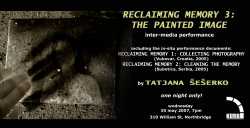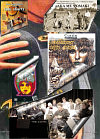page 2 of 7
1. The context of the definitive cultural Other
Prior to the project description and the analysis of its salient theoretical speculations, I will define my position as a migrant artist, currently residing in Australia. The cross-cultural dialogues appear on a multiplicity of levels in artistic approaches in this country.
I immigrated to Perth, in the West of the continent in 1995, from Subotica, a town situated on the Serbian-Hungarian border. This region belongs to the geopolitical formation that was known as Socialist Federative Republic of Yugoslavia (SFRY) until 1991. The country has undergone a series of violent fragmentations since then due to a multiplicity of armed multiethnic conflicts. Subotica is situated in Vojvodina, Serbia’s northern provenance, and sits between the Central European region and the South East, which is generally known as the Balkans. The Balkans, and more specifically Yugoslavia, has undergone a series of redefinitions of its political boundaries and its related terminologies. In order to avoid the confusion of how to exercise political correctness of the definition of the geopolitics of former Yugoslavia, I will quote Slavoj Zizek where he wittily explained that:
“For Serbs [Balkan] begins down there in Kosovo or Bosnia, and they defend the Christian civilization against this Europe’s Other. For Croats, it begins with the Orthodox, despotic, Byzantine Serbia, against which Croatia defends the values of democratic Western civilization.
For Slovenes, it begins with Croatia, and Slovenes are the last outpost of the peaceful Mitteleuropa. For Italians and Austrians, it begins with Slovenia, where the reign of the Slavic hordes starts.
For Germans, Austria itself, on account of its historic connections, is already tainted by the Balkanic corruption and inefficiency.
For some arrogant Frenchmen, Germany is associated with the Balkanian Eastern savagery - up to the extreme case of some conservative anti-European-Union Englishmen for whom, in an implicit way, it is ultimately the whole of continental Europe itself that functions as a kind of Balkan Turkish global empire with Brussels as the new Constantinople, the capricious despotic centre threatening English freedom and sovereignty.” (Zizek 1998)
The provision of this quote may generally portray the problematic of the peculiar position of the Balkans, and former Yugoslavian republics, which have separated into five independent countries within the past decade. The separation of the region and massive ethnic shifting have portrayed a problem in terms of defining the Balkan cultural identity. This problem is also prevalent among the former Yugoslavian Diaspora. The movements of displaced former Yugoslavian population have reached three million uprooted people since 1991. Hundreds of thousands of people fled the countries, as a result of armed conflict, violence and inter ethnic tensions, while others “fled the oppression” (Philips 2003) 1 of the political regime run under Slobodan Milosevic.
I moved to Australia in 1995 as a result of the ongoing political tensions in former Yugoslavia. It was in Australia that I began seeing my own past and my own experience of living in Yugoslavia from a distance. I realised that the plurality of cross-cultural spaces and their boundaries in Australia multiplied even further in comparison to the previous native experience. The transit and an incessant desire to “return home” has started to inform my art practice through acquisition of language that could express in-between spaces, and through the transient medium of temporal performance. The idea of transit and memory led me to construct projects of a performative nature. Temporal performance is a medium that could effectively speculate upon the transient notion of migration and cross-cultural dialogues through creative expression. I decided to create intermediate projects that reflect upon the methodology of communication in order to bridge the gap between distances. The telecommunication utilised in the context of these performances introduces a certain level of unpredictability associated with the technical and corresponding outcomes.
page 2 of 7
1 The article that is used as a source in this paper to portray statistical information about the movements of population as a result of the civil war in the areas of former Yugoslavia is one out of many articles available. In order to read more about this issue, please refer to the specified web site in the bibliography. The information provided by various resources may vary due to the constant change of facts up to date.
Most [The Bridge]: Inter media performance - an article by Tatjana Seserko (Tatjana Šešerko)
 |
|||||||||||
| [Drama] | |||||||||||
 |
|||||||||||
| [Alexandria] | |||||||||||
|
Virtual Cultural Centre of WA |
|||||||||||




